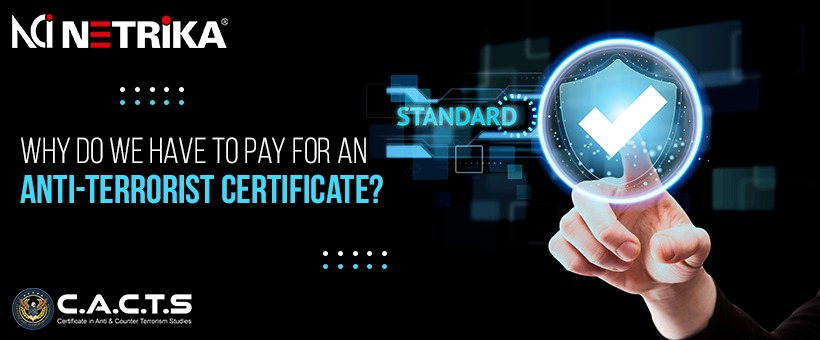News & Events
Why do we have to pay for an anti-terrorist certificate?
- January 17, 2024
- Posted by: marketing@netrika.com
- Category: Blogs

Anti Terrorism Certification
Aside from the growing buzz on the need for anti-terrorist certificates by professionals, and the more overwhelming question of who or what is being certified, and by whom – and why it will entail having to pay for such certification – another important question that looms over candidates is why should they have to pay for an anti-terrorist certificate and could it be a scam?
Let’s understand the concept of anti-terrorist certificates and any associated costs.
1. No Universal Anti-Terrorist Certificate
In contrast to what is often portrayed, there is no anti terrorism certificate, no definitively equivalent authorization with the same legal effects and exact procedural requirements across the globe, that everyone is supposed to have. However, institutions and agencies provide a counter terrorism certificate on an unclassified level that incorporates but is not limited to best practices, the latest trends, global terrorism trends, explosives, and their effects, methods of attacks, tactics, techniques, the process of the operational plan, use on internet and IT for terrorist purposes and the evolving nature of terrorism.
2. Law Enforcement Measures
The certification and security requirements of counter-terrorism are generally managed and implemented by government and law enforcement agencies or authorized institutions. It is a tool to make you safer and your country more secure by improving the resilience of critical infrastructure.
3. Misunderstanding or Misinformation
The notion of an anti-terrorist certificate with a payment is probably due to the circulation of confusion or disinformation. It’s crucial to rely on accurate and official information from authoritative sources.
4. Security Measures and Public Safety
Governments of all countries take measures to secure their countries, their citizens, and their infrastructures. Certifications related to security are usually integrated into broader national security frameworks.
5. Potential Scams and Frauds
The advice for individuals and businesses who see these payments for security or certification is the same: beware of fraudsters!
Terrorism fears could be exploited to trick people or organizations into paying for sham certificates.
6. Verification of Legitimacy
However, we should not pay for anti-terrorism measures before we have confirmed that the ‘request to pay is genuine. Official government websites, law enforcement agencies, and security organizations are reliable sources of information.
7. Educating the Public
Public education therefore acts as a prevention of anti-terror scams, both for private individuals and corporate entities. Educational programs could help debunk myths and make sure that everyone is familiar with real security procedures.
The notion of having to pay for an anti-terrorist certificate raises eyebrows due to its lack of basis in established security practices. Governments and law enforcement agencies take comprehensive measures to counter terrorism, and individuals should be cautious about potential scams. Staying informed, verifying information with official sources, and promoting public awareness are essential steps in navigating the landscape of security-related measures.
Anti Terrorism Training Courses
Netrika Consulting understands this dilemma of candidates who wish to obtain a counter terrorism certification but are overwhelmed by which genuine course to choose. The certified anti terrorism specialist (CACTS) by Netrika is designed with real-world case studies and counterforces and familiarises candidates with the threats and difficulties facing international security. The course is aimed at improving the understanding of terrorist threat identification and pattern trends with thorough and value-added CACTS certification training.

